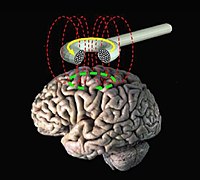
Photo from wikipedia
INTRODUCTION Random noise stimulation was reported as the more effective and safer type of electrical stimulation techniques in relieving tinnitus symptoms. The multisite protocol of transcranial random noise stimulation has… Click to show full abstract
INTRODUCTION Random noise stimulation was reported as the more effective and safer type of electrical stimulation techniques in relieving tinnitus symptoms. The multisite protocol of transcranial random noise stimulation has shown additional favorable effects. OBJECTIVE Here we will discuss the role of applying eight sessions of multisite transcranial random noise stimulation in decreasing tinnitus loudness and annoyance without exerting additional adverse effects. METHODS Twenty-nine subjects (8 female), the mean age of (45.34±9.57) with chronic tinnitus received transcranial random noise stimulation in the multisite protocol, 10min of auditory-transcranial random noise stimulation applied over the T3, T4 preceded by 10min of prefrontal-transcranial random noise stimulation applied over F4, FP1. In the first group, only one session was applied and the multiple-sessions group contained eight repeated sessions. Visual analog scale scores for loudness and distress were recorded before and immediately after the treatment. Multivariate repeated measure ANOVA test was used and minimal detectable change calculated. RESULTS There was a statistically and clinically significant reduction in tinnitus loudness and annoyance in both groups (p<0.05, effect size (η2)>0.8), while the amount of annoyance suppression in the multiple-sessions group was significantly greater than the single-session group. The patients of the multiple-sessions transcranial random noise stimulation group reported an improvement in their sleep and lower tinnitus handicap inventory scores without experiencing any additional adverse effects of the intervention. CONCLUSIONS The results of this study showed a substantial improvement in tinnitus symptoms by using the multiple sessions of transcranial random noise stimulation in the multisite protocol without producing any additional side effects. We suggest further clinical trials with long-term follow-up be investigated.
Journal Title: Brazilian journal of otorhinolaryngology
Year Published: 2018
Link to full text (if available)
Share on Social Media: Sign Up to like & get
recommendations!